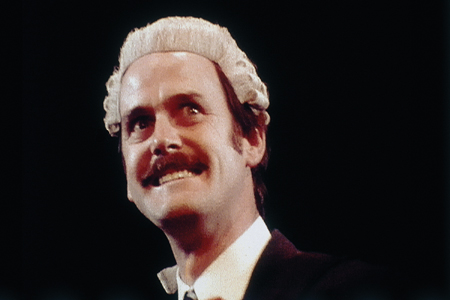
You know that cultural journalism is in a sorry state when only four people show up for a screening, and not a single dead soul (save for myself, still chortling with pulse) has the courage to laugh at legendary comedy material or get excited by consummate performers tinkering with sketches like tetchy scientists.
I was in a darkened theater for a film called Pleasure at Her Majesty’s, part of The Secret Policeman’s Film Festival, which kicks off this Friday at the Lincoln Center. The Festival even includes, for those cineastes saddled with an equine constitution, a full screening of the 660 minute film, A Conspiracy of Hope — essentially Amnesty International’s 1986 answer to Live Aid, but probably not up there with The Rolling Stones Rock and Roll Circus. Despite the hopeful title, you won’t find Freddie Mercury wowing at Wembley. This screening seems to be a wild gamble on the Film Society’s part. For who out there in New York is really interested in 23-year-old footage of Jackson Browne and Bryan Adams? (Then again.)
The common assumption is that, if an esteemed film society is holding something called The Secret Policeman’s Film Festival, you should probably check out the main film. But I’m here to tell you that you can probably skip the primary offering. The true can’t-miss movie here is Pleasure at Her Majesty’s, which features some fascinating behind-the-scenes footage of, among many geniuses, the Monty Python troupe (sans Eric Idle) rethinking the Courtroom Sketch. We see the Python team trying to pinpoint why the sketch doesn’t entirely work. They make changes. They argue. And even after they have performed the sketch later in the film and have received laughs, John Cleese walks off-stage and remains unconvinced that it worked with the audience.
This is fascinating if you’re interested in dramatic rhythm. And it isn’t just Python here. Deep division among the Beyond the Fringe performers is intimated in a conversation with Alan Bennett and Terry Jones, both seemingly unaware of the camera. “I could never do anything you do,” says a wan-faced Bennett. “The atmosphere with you is different. You don’t seem competitive in the way we were.” And we begin to wonder if Beyond the Fringe’s anti-authoritarian comedy was motivated by internal strife. At what social cost does one break new ground?
The Secret Policeman’s Ball, which doesn’t permit us these interesting peeks behind the curtain and features more music in the place of many comedy sketches, remains an enjoyable if badly dated film. The Amnesty organizers began changing the formula. And the contrast can be seen in the choices. Pleasure has Neil Innes’s delightful “Protest Song.” Policeman gives us Tom Robinson’s “Glad to Be Gay”: brave at the time, but precisely the kind of sanctimonious fury that Innes was satirizing.
In Policeman, Peter Cooks’s sendup of the Jeremy Thrope 1979 trial is funny, but only if you know all the scandalous details. It is indeed ironic that the very sketch Cook wrote in response to criticisms that the Amnesty shows contained nothing more than regurgitated material has secured its own time capsule. And the less said about Billy Connolly, the better.
On the other hand, one of Policeman‘s highlights is a wild and wonderful performance from a pre-Doctor Who Sylvester McCoy. McCoy hammers a four inch nail into his nose and attempts to dodge a toy train approaching his testicles with a fork while he remains chained to a chair. The late David Rappaport is even involved. McCoy’s antics, which involve jumping atop audience heads while wearing a kilt, are almost unthinkable today. McCoy — and Rowan Atkinson, who appears in an early version of his Schoolmaster sketch — presents the kind of free-wheeling comic anarchy no longer welcomed in our sanitized corporate atmosphere, where uncourageous Establishment types like John Hodgman stand before an audience, tell them the “clever” niceties they like to hear, and fail to challenge their assumptions. (Stephen Colbert, on the other hand, had stones.)
But Policeman stands in the shadow of Pleasure. Unlike Policeman, which features “slight direction by John Cleese,” Pleasure really permits us to see just how brilliant Cleese is on stage. A filmed version of a stage show limits itself by necessity to subjective camera angles, but the sheer authoritative energy that Cleese brings to the Dead Parrot sketch (with the line “This is your nine o’clock alarm call” added when he beats the parrot) is a marvel to behold.
Pleasure‘s vérité format permits us to witness a strange old boy’s world where John Cleese is seen with a McDonald’s cup of coffee in one hand and a cigarette in the other, and everybody is fiercely competitive. There’s one moment in which Jonathan Miller and Barry Humphries puff nervously on their smokes and bitch about who’s the oldest. Small wonder that it took a high-energy legend like Miller to corral these guys together.
But the lack of women in both films, aside from Eleanor Bron and Carol Cleveland, is unsettling. A few decades (and a few more Policeman films) later, women are now finally permitted to be funny, even when Christopher Hitchens declares that they aren’t. It’s just too bad that comedy remains shoehorned by the cobblers who wish to keep talent running inside the track. The Policeman films document a bygone era in which you could get crazy for a good cause. Perhaps it’s still possible today, if some innovator with deep pockets conjures up some charitable comedy that’s feral and progressive and inclusive.